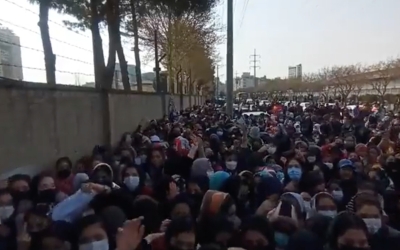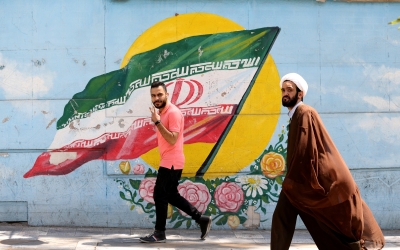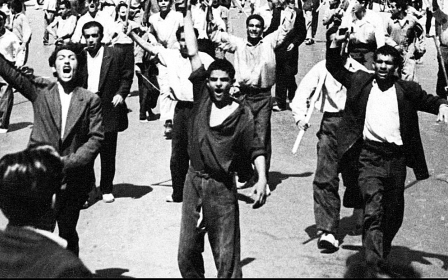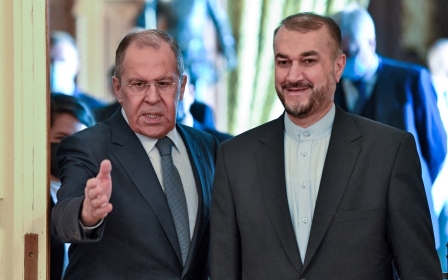Iranian press review: Football authorities fight over Fifa’s $10.5m prize

Iran's football officials scrap over World Cup money
A former president of Iran’s football federation has revealed that the sports ministry and federation officials are fighting over who gets Fifa’s $10.5m prize awarded to teams taking part in the group stage of the World Cup, according to an interview with the Etemad daily.
“All the fights in the Football Federation of the Islamic Republic of Iran (FFIRI) are over who would receive and spend the Fifa’s over $10 million prize,” said Mohammad Dadkan, a veteran footballer, as Iranians celebrate the national team qualifying for the 2022 World Cup.
“Does anyone know what happened to that prize Fifa gave our team in the 2006 World Cup? I urge the General Inspection Organisation of Iran and other judicial bodies to investigate that case.”
Dadkan was the FFIRI president when Iran’s national football team qualified for the 2006 World Cup before he was sacked during the tournament in Germany.
In the interview, Dadkan also commented on the police attack on female football fans who wanted to watch Iran’s match against Lebanon in the holy city of Mashhad, saying that he had been sure that the authorities would not allow women to enter the stadium on that day.
“Those who say the ban on women watching football matches is due to religious laws are liars. There’s a lot of depravity happening in Mashhad, and no one talks about it, but if a girl wants to enter the stadium, will that harm the religion? This is a lie,” he said.
During his time in office, for the first time after the 1979 revolution, women were officially permitted to enter Azadi Stadium to watch a match between Iran and Bahrain in 2006.
Iran becomes source of medicine trafficking
The head of Iran’s Food and Drug Administration, Bahram Daraei, said medicine trafficking from Iran to neighbouring countries has caused a shortage and a sharp rise in the prices of the medicines in the Islamic republic, the Hamshahri daily reported.
According to the daily, antibiotics, cancer medications, insulin, Ritalin and medicines for rare diseases “are easily being smuggled” from the country.
“We produce certain medicines more than our need, but because of trafficking, we are facing a shortage,” the daily quoted Daraei as saying.
“For example, Iran produces tuberculosis pill Rifampin, two times more than it needs, but this medicine is easily trafficked to Afghanistan in trucks and containers.”
Daraei also revealed that in 2020 only half of the insulin pens imported with subsidised foreign currency to the country were distributed, and the other half of the imports “disappeared”.
Daraei’s comments contrasted with claims by other high-ranking officials who blamed the US sanctions for the medicine shortage in the country.
Decline in children's literacy
Education experts and teachers have warned that low literacy has dramatically increased among students in the first two grades of primary school, Khabar Online reported.
According to the teachers that the daily spoke to, since the beginning of the Covid-19 pandemic, the number of students who cannot fluently read Farsi from their textbooks has been on a sharp rise.
Zahra Khomami, a first-grade teacher, told Khabar Online that students are struggling with forming correct sentences.
“Many students in the second grade still don’t know the alphabet completely, and they don’t know how to form a sentence,” she said.
Khomami explained that the education crisis has had more negative impacts on students from low-income families.
Experts said that ineffective distance learning methods and lack of internet access for students were the leading cause of the current decrease of literacy in Iran.
Cell phones at the top of import list
As Iran faces shortages in essential commodities and medicine, a report has found that cell phones were the product most imported to the country during the last Iranian year, which ended on 20 March, according to the ISNA news agency.
The value of the imported cell phones during the first 10 months of that year was over $4bn, a 70 percent increase compared to the previous year.
The second most imported products were corn, valued at $3.3bn, and wheat at over $2.5bn.
Other goods imported during the same period were oilseeds, barley, tractors and vaccines.
In past years, several Iranian outlets had reported that the import of cell phones to Iran had been controlled by a small group of traders connected to the political elite.
*The Iranian press review is a digest of reports that are not independently verified as accurate by Middle East Eye
Middle East Eye delivers independent and unrivalled coverage and analysis of the Middle East, North Africa and beyond. To learn more about republishing this content and the associated fees, please fill out this form. More about MEE can be found here.







